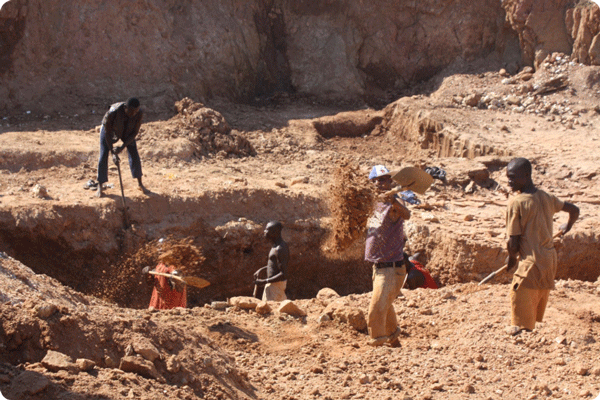
There is a popular proverb that says “when elephants fight, it is the grass that suffers”. While the on-going battle between the Mines and Mining Development ministry and artisanal miners rages on, it is the environment in the mining areas that is suffering the most.
environment By Chipo Masara

Artisanal mining is a reality in Zimbabwe’s economy. While the “criminal” tag placed on them has ensured that the artisanal miners are constantly harassed by police, it has done absolutely nothing to deter them. How can they allow themselves to be scared off when artisanal mining is their only source of survival in a country hit by an unemployment rate hovering above 85%? So daring has been the artisanal miners that in places like Penhalonga, many women have joined the gold-mining trade that was traditionally dominated by their male counterparts.
People that live in areas endowed with minerals — mostly gold — and who constitute a large number of the artisanal miners, do not understand why the government has over the years been doing all it could to make it difficult for them to also benefit from the “national wealth”. Police are ever present in mineral-rich communities to stay on the lookout for the miners who are locally referred to as makorokoza. Running battles between the artisanal miners and the police are common in such areas, although the bribing of police officers for them to sometimes turn a blind eye is reportedly rife.
Amidst it all, deliberations have for years been on-going, with organisations such as the Farai Maguwu-led Centre for Natural Resources Governance vehemently calling for the formalisation and regularisation of artisanal mining — a move the government has not been too keen to make. But through it all, the responsible authorities seem to have forgotten to also consider how much the environment is being affected by the hit-and-run manner in which the miners have for years been forced to operate.
Many environmentalists have over the years voiced their concerns about how, for instance, gold mining is leaving a legacy of extensive and often irreversible environmental and health impacts. Most notable has been an increase in the use of mercury in gold processing, which has been contributing to serious health and ecological impacts. A good example is that of Ngwabalozi River, about 30km south of Bulawayo where artisanal miners are using mercury to recover gold from the ore in a process called amalgamation — a mining procedure that involves a number of rudimentary practices that are not only polluting the air but are also contaminating water bodies — an unfortunate development in an area that receives very little rainfall. The situation is more or less the same in mining areas like Penhalonga, Shurugwi, Kwekwe, Bindura, Zvishavane, Gwanda etc, where the environment is in a sorry state owing to especially the artisanal miners’ activities.
But the government may have finally realised that they cannot wish the artisanal miners away as they are there to stay. That is why central bank chief John Mangudya recently had to “decriminalise” gold possession, in an ironic move where he is allowing artisanal gold miners to sell their gold hassle-free, even when they would have obtained it “illegally”. To many, such a move simply does not make sense as it does nothing to correct the situation on the ground. In fact, it will serve to worsen environmental destruction.
What government simply needs to do is review the Mines and Minerals Act and ensure that artisanal miners are not only formalised, but regularised — allowing them to operate legally. That is the only way to ensure that they operate within the confines of the country’s mining law and that their operations are monitored.
- Chamisa under fire over US$120K donation
- Mavhunga puts DeMbare into Chibuku quarterfinals
- Pension funds bet on Cabora Bassa oilfields
- Councils defy govt fire tender directive
Keep Reading
When the artisanal miners no longer have to hurriedly and carelessly extract the minerals, fearing that the police may pounce on them at any time, only then will we see the situation improving. With their operations regularised, it will become easier even for the Environmental Management Agency to ensure that the miners are governed by the Environmental Management Act (CAP 20:27), which calls for all mining operations to be conducted in a way that does not damage the environment but ensures that the minerals are obtained in a sustainable manner.
For feedback, [email protected]











